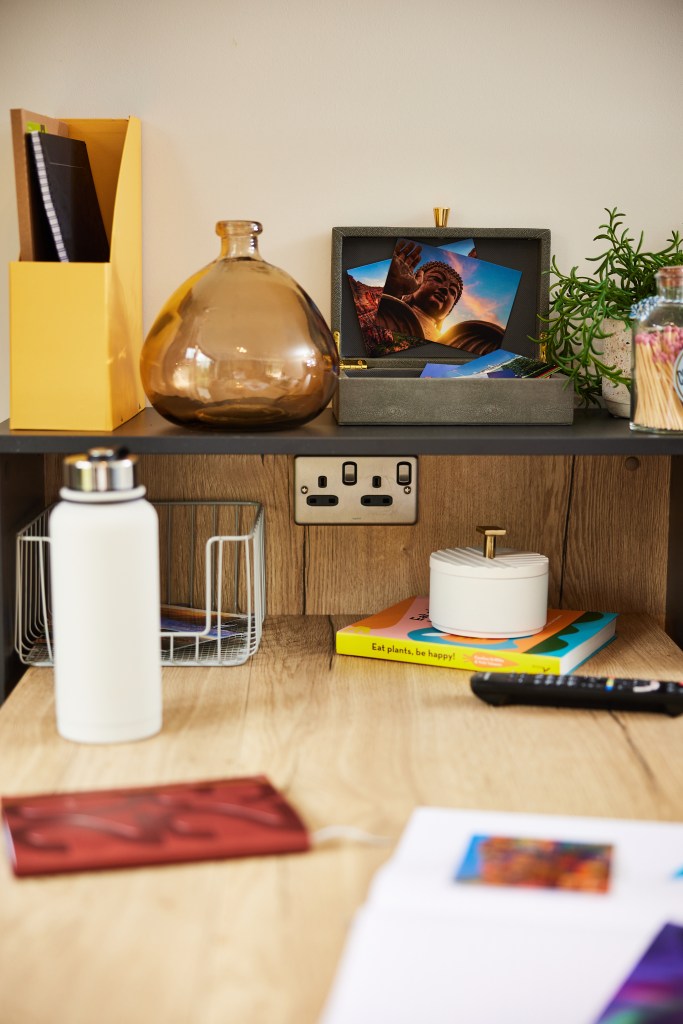A guest blog from our resident Jnnat.
Studying abroad is an exciting adventure that opens up new horizons, but it also comes with the responsibility of packing all the student living essentials you’ll need during your stay. As a seasoned student who has lived abroad, I understand the importance of being well-prepared for this journey. In this comprehensive guide, I will share insights into student bedroom essentials, student laundry essentials and what to pack as an international student, as well as provide you with valuable tips and recommendations.

packing basics for international students
Before delving into specific items, let’s start with some general packing tips for students living abroad:
1. Check with Your University or Accommodation Provider: Different universities and countries may have varying guidelines on what you can bring. Always check with your university’s housing department, student accommodation provider, or international office for any specific requirements or restrictions. If you live at Vita Student , you can see a list of prohibited items in our FAQs.
2. Travel Light: While it’s tempting to pack everything you own, remember that you’ll likely have limited space. Prioritise the essentials and consider purchasing additional items once you arrive.
3. Versatile Clothing: Pack versatile clothing suitable for different seasons. Layering is key to adapting to changing weather conditions. Read my guide to surviving winter as an international student.
4. Essential Documents: Ensure you have all your important documents such as passports, visas, university admission letters, and any necessary medical records. You’ll also need these to set up a bank account in the UK.
Now, let’s dive into the room essentials you’ll need:

clothing and bedding
1. Warm Clothes: Depending on your destination, you may encounter cold weather. Don’t forget to pack warm clothes like sweaters, scarves, and gloves.
2. Puffer Jacket: A good-quality puffer jacket is essential for staying warm during winter months.
3. Bedding: While some student accommodations provide bedding, it’s a good idea to bring your own if you have specific preferences. Consider a cosy comforter, sheets, and extra pillowcases — this will form part of your key student bedroom essentials.
4. Vita Pack: The Vita Pack is a lifesaver for students living abroad. It includes student living essentials like utensils, plates, bowls, and towels, making it convenient and cost-effective.
Electronics and accessories
1. International Adapters: Ensure you can charge your electronic devices by packing international adapters compatible with your destination’s plug types.
2. Laptop and Chargers: Your laptop is a crucial tool for studying and staying connected with loved ones. Don’t forget chargers and any necessary accessories.
3. Mobile Phone: Bring your unlocked mobile phone and consider purchasing a local SIM card for affordable data and communication.
4. Noise-Cancelling Headphones: These can be a lifesaver in noisy environments or during long flights.

Household Essentials and Additional Purchases
1. Cleaning Materials: Depending on your accommodation, you may need to purchase cleaning materials such as brooms, mops, and cleaning sprays to keep your room tidy.
2. Extra Bed Sheets and Linens: Having spare bed sheets, pillowcases, and towels can be helpful, especially during longer periods between laundry days.
3. Hangers: Invest in a few sturdy hangers to keep your clothing organized and wrinkle-free.
4. Laundry Baskets: A laundry basket or hamper is essential for collecting dirty clothes and transporting them to the laundry facility.
Personal Care and Health
1. First Aid Kit: A basic first aid kit with items like band-aids, pain relievers, and antiseptic wipes is a must.
2. Prescription Medications: If you have any prescribed medications, ensure you have an ample supply and the necessary documentation for customs.
3. Toiletries: While you can buy toiletries locally, it’s a good idea to bring some travel-sized essentials to get you started.
Kitchen and Cooking
1. Cookware: If you plan to cook your meals, consider packing a few basic pots, pans, and cooking utensils.
2. Reusable Water Bottle: Staying hydrated is important, and a reusable water bottle is eco-friendly.

What to Leave Behind
While it’s essential to know what to pack, it’s equally crucial to understand what cannot be carried internationally or may not be practical to bring:
1. Large Furniture: Avoid bringing large furniture items as they are difficult to transport and may not fit in your new accommodation.
2. Perishable Foods: Don’t pack perishable foods or liquids that may spill during travel.
3. Illegal Items: Be aware of the laws in your destination country and avoid carrying items that are illegal or prohibited.
4. Excessive Items: Try not to overpack. Remember, you can purchase many items locally once you arrive.
Additional Essentials for Students Abroad
Now that we’ve covered the basics, let’s explore additional student living essentials that can enhance your experience as a student living abroad:
1. Language Resources
If your destination country has a language different from your own, invest in language-learning resources like textbooks, online courses, or language-learning apps. Being able to communicate effectively will greatly enhance your experience and help you connect with locals.
2. Cultural Adaptation Essentials
Living in a new country means adapting to a different culture. Consider packing items that can help you adapt more easily, such as travel guides, books about the local culture, or traditional clothing if appropriate.
3. Comfort Items
Bringing a few comfort items from home, such as photos, a favourite blanket, or familiar snacks, can help combat homesickness and make your new environment feel more welcoming.
Read more about how you can decorate your university room.

WHAT YOU CAN NOT CARRY INTERNATIONALLY
Understanding what you cannot carry internationally is just as important as knowing what to bring. Here are some common items that may be restricted or prohibited:
1. Weapons and Firearms: It should go without saying, but any weapons or firearms are strictly prohibited when travelling internationally.
2. Illegal Substances: Definitely do not carry any illegal drugs or substances, even if they are legal in your home country.
3. Certain Food Items: Some countries have strict regulations on importing food items, particularly fresh fruits, vegetables, and meats. Check your destination’s customs rules to avoid any issues.
4. Hazardous Materials: Items like fireworks, flammable liquids, and chemicals are typically not allowed in your luggage.
5. Currency Limits: Most countries have limits on the amount of foreign currency you can bring, so be sure to check these limits to avoid any legal complications.

Preparing for life as a student living abroad is an exciting journey that requires careful planning and consideration. By packing the right room essentials, adhering to the guidelines provided by your university and destination country, and being aware of what you cannot carry internationally, you’ll be well-prepared to make the most of your study abroad experience.
Don’t forget to embrace the adventure, make new friends, and immerse yourself in the culture of your new home. Studying abroad is not only an educational opportunity but also a chance for personal growth and exploration. Safe travels and may your experience as a student living abroad be enriching and memorable!



